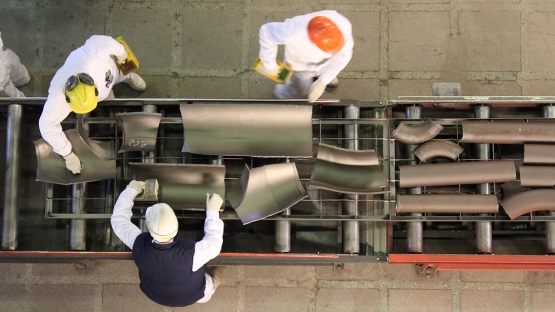The International Technical Committee on Radioactive Waste Management, Decommissioning and Environmental Remediation (WATEC), a consultative body that provides advice to the IAEA, delivered its annual report today to IAEA Deputy Director General Mikhail Chudakov, Head of the Department of Nuclear Energy.
The report by WATEC, which brings together some 30 senior professionals from around the world, included a series of observations and recommendations for the Agency. The report was the product of four virtual meetings, held in May and June amid the global pandemic, at which participants from 25 countries and 5 international organizations shared information and helped develop the IAEA’s programmatic outlook in an area vital to the sustainability of nuclear energy.
“The effective management of radioactive waste, decommissioning and environmental remediation are vitally important topics,” Chudakov said in today’s virtual meeting. “By working together to harmonize and share our knowledge, we continue to show that solutions to issues in all of these topical areas exist and can be applied effectively. Addressing these challenges allows the global community to continue to benefit from nuclear technology.”
Among its recommendations, WATEC noted that there is a wealth of guidance material on the end states of nuclear sites, depending on whether the perspective is radioactive waste management, decommissioning or remediation. In some cases, WATEC said it may not be possible to fully satisfy the expectations established in all the guidance, and so encouraged IAEA experts to jointly consider this topic in their future work.
WATEC also noted the importance of management at key transition points—for example, from operations to decommissioning—in maintaining key knowledge, skills and resources. And WATEC urged its members and the IAEA to further strengthen their cooperation in sharing information globally about their work.
This year’s virtual meetings, which focused on fewer topics than usual, required some additional creativity and flexibility. WATEC members were up to the task, having already worked for many years using shared online documents within NUCLEUS, an IAEA information resource portal to scientific, technical and regulatory resources. Participants also made use of CONNECT, an IAEA platform for professional networks and communities of practice that includes DSRSNet, a newly launched network on Disused Sealed Radioactive Sources.
“The foundations were there in terms of content, input and tools, and having a very positive group involved in WATEC – both from the Member States and from the Secretariat – meant that we had a good start that helped us deliver our recommendations,” said Philippe Lalieux, Chair of WATEC and Director of Long-Term Management at ONDRAF/NIRAS in Belgium.
Each of the four three-hour virtual meetings had around 30 participants, spanning time zones from Argentina, Brazil and Brazil to South Africa, Sudan and Sweden and Australia, Japan and the Philippines, among others. The web meetings featured presentations from three volunteer rapporteurs, drawn from the WATEC Membership: Elvira Maset (CNEA, Argentina), Smitha Manohar (BARC, India) and Vivian Pereira Campos (CCHEN, Chile).
“Conducting the meetings online was challenging, but we managed to come up with a solid outcome and constructive recommendations for the Agency,” Pereira said.
Each rapporteur summarised the current status and trends in radioactive waste management, decommissioning and environmental remediation from each of three groups of Member States—those with very large nuclear power programmes, those with small- to medium- nuclear power programmes, and those using radioisotopes in medicine, industry and other applications.
“The input from Member States was very effective in helping me to prepare a comprehensive summary,” Maset said. “WATEC provides a really good platform for exchanging scientific and technical ideas. And this year’s virtual event went very well – even though we are all keen to see each other once again.”





